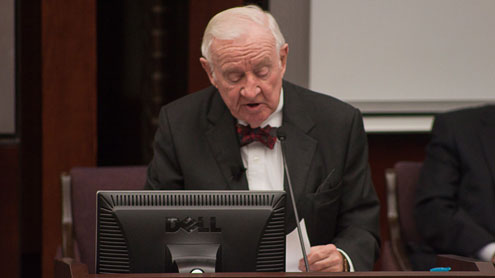Former Associate Justice to the Supreme Court John Paul Stevens outlined some major cases in his career and imparted advice to the gathered students Wednesday during a lecture at UA’s School of Law.
Much of Stevens’ lecture was centered on the Supreme Court’s controversial ruling Kelo v City of New London.
The case, decided in 2005, came about when the city of New London, Conn. wanted to use eminent domain to force nine property owners off their land in order to use it in a redevelopment plan.
“In my view the Kelo majority opinion was rightly consistent with Supreme Court precedent and with the Constitution’s text and structure,” Stevens said. “The popularity and policy wisdom of that decision may be an issue for the political branches as the Kelo majority noted, but it is not an issue for the Supreme Court.”
Stevens authored the majority opinion in the 5-4 decision and does not regret it.
“I am not at all sure that the plan that we have approved was wise policy, but I remain firmly convinced that the 14th amendment did not deprive the states of the power to adopt it,” he said.
Paul Rand, a second year law student who attended the lecture, said he appreciated the rare opportunity.
“There’s only nine of them so I didn’t want to miss this,” Rand said. “I really enjoyed the fact that he only spoke on one case in particular.”
Stevens also fielded questions from the audience about a wide variety of subjects including what he was most surprised about when he became a justice.
“Honestly, the thing that surprised and gratified me the most about the Supreme Court was that Thurgood Marshall had been telling the truth when he said that members of the court got along beautifully on a personal basis,” Stevens said.
When asked about the possibility of allowing television cameras in the Supreme Court, Stevens gave two differing opinions on the controversial matter.
“I believe that it would be desirable to have the public better understand how well-prepared the justices are and what a good job they do discussing the issues of a case,” he said. “But the problem with the televising is that whenever you introduce television in an area that it hasn’t been before, sometimes unintended consequences flow,” he said.
Stevens then went on to give the example of the commercial induced breaks during a football game to drive the point home about how TV can change the culture of an entity.
“And introducing television into the confirmation hearings has lengthened the process considerably,” Stevens said. “When I went through the process, there were two or three minutes of introductions and then they started the questions. Now they spend the first day talking about how important the hearings are.” Stevens said he most regretted his decision in Jurek v. Texas, one of the five consolidated appeals that reinstated the death penalty in 1976.
Since that decision, Stevens has become a vocal critic of capital punishment.
Stevens also weighed in on the brewing controversy surrounding potential conflicts of interest in the judgment of the 2010 Affordable Care Act.
He also said he doesn’t believe that Justices Elena Kagan or Clarence Thomas should recuse themselves from the case since, “anytime a justice recuses himself or herself from a case, you run the risk of an eight-person divided court, which would cause all sorts of unnecessary expense.”
Stevens then said he is “still of the view that we should trust members of the Supreme Court to act responsibly.”
Stevens also lightly rebuked Justice Sonia Sotomayor’s assertion made during her confirmation hearing that empathy does not play a role in judicial rulings.
“I think that it is inevitable that any judge is going to be affected by his or her background. It’s not a plus or minus, it’s just something that is there since you feel certain ways about certain things because of life experiences.” Stevens said.
Paul Horwitz, the Gordon Rosen Professor of Law, said he believed Stevens did students a great service by letting them see how far they can go.
Stevens finished with words of wisdom for students.
“Don’t decide what you’re going to do 20 years from now, decide what you’re going to do next,” he said. “Take your problems one at a time. And don’t be afraid to say ‘I don’t know.’ And remember the one terribly important asset that you have in the legal profession is that your word is good.”









